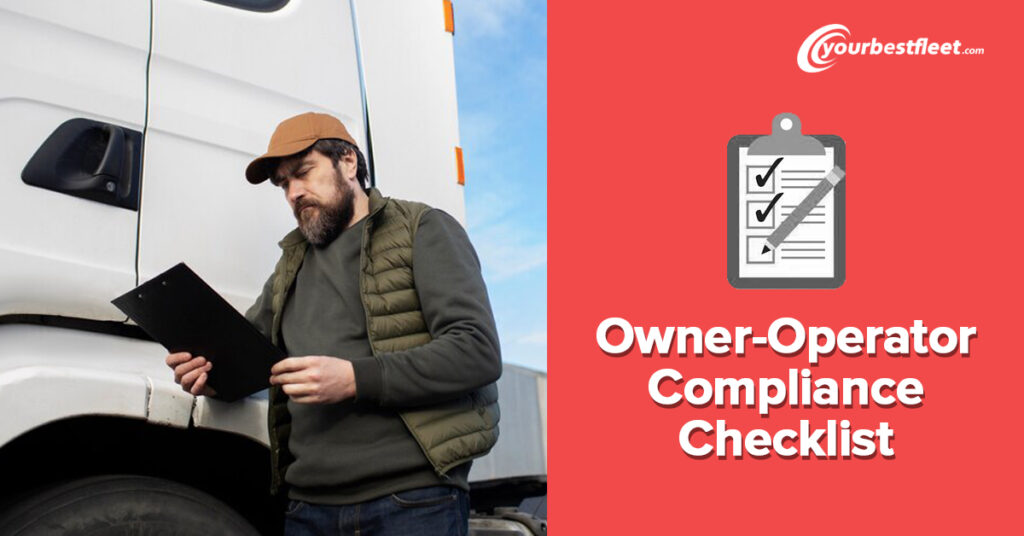Key Takeways
- Owner-operators must register with FMCSA and obtain proper licenses to operate legally.
- HOS compliance and ELD usage are mandatory to track driving hours.
- Proper insurance, IFTA tax filing, and IRP registration ensure financial compliance.
- Routine maintenance and DVIRs help prevent breakdowns and fines.
- Drug and alcohol testing and maintaining a DQF are required for safety compliance.
Being an owner-operator means running your own trucking business and handling everything from licenses, permits, and insurance to maintenance, taxes, and safety regulations. Compliance is not just about following the law—it’s about keeping your business running without interruptions.
Failing to meet federal, state, and local regulations can lead to heavy fines, lost income, truck impoundment, or even the suspension of your operating authority. This detailed checklist ensures you meet all legal and regulatory requirements to operate smoothly and stay on the road.
Compliance Checklist for Owner-Operators
The compliance checklist is a vital instrument for owners and managers that helps them run their businesses quickly and adequately while making the most of important resources. It turns restrictions by regulations into chances for good things to happen. The key elements of the plan are discussed below:
Hours of Service (HOS)
The FMCSA enforces Hours of Service (HOS) rules to prevent driver fatigue and reduce accident risks. As an owner-operator, you must follow these rules:
- 11-hour driving limit – You can drive a maximum of 11 hours after 10 consecutive hours off-duty.
- 14-hour workday limit – All driving must be completed within 14 hours of starting your shift.
- 30-minute break rule – After 8 hours of driving, you must take a 30-minute break.
- 60/70-hour weekly limit – You cannot exceed 60 hours in 7 days or 70 hours in 8 days.
- 34-hour restart rule – Reset your weekly driving hours by taking 34 consecutive hours off-duty.
Maintaining Updated Records

It is not enough to just follow the rules. Owner-Operators must demonstrate that you have followed them. You should have documentation containing the origin and destination of each journey for each 24 hours of duty. The following particulars need to be considered for record-keeping:
- Record the total number of hours (classified as driving, sleeping in a berth, being on duty, and off-duty).
- The origin and destination of each trip should be listed on the relevant document.
- Receipts with expenses paid are also helpful in demonstrating that the drivers took a break.
- The FMCSA mandates that records be kept for a minimum of six months.
Business Registration & Licensing
Before you can legally operate, you need to register your trucking business and get the proper licenses.
What You Need:
DOT Number & MC Authority –
- A DOT Number from the Federal Motor Carrier Safety Administration (FMCSA) is required for interstate trucking.
- An MC Authority allows you to haul freight across states.
Unified Carrier Registration (UCR) –
- If you drive in multiple states, you must renew your UCR annually.
- The fee depends on how many trucks you own.
-
Business Formation –
- Choose a legal business structure:
- Sole Proprietor – Simple but offers no legal protection.
- Limited Liability Company (LLC) – Protects personal assets.
- S-Corp – Helps reduce self-employment taxes.
-
BOC-3 Filing –
- Appoint a process agent to handle legal paperwork in states where you operate.
Why This Matters:
Without these registrations, you cannot legally operate. Running a trucking business without them could result in heavy fines or shutdowns.
Use of Electronic Logging Devices
According to the FMCSA, most motor carriers and drivers who must keep a record of duty status (RODS) must carry an electronic logging device (ELD). Owner-operators operating under their authority must determine if the ELD rule applies to them.
ELDs can assist you in keeping track of all information by automatically recording your driving time and location to promote safe working practices as per regulations. You must obtain an ELD from a source certified and registered with the FMCSA. The application of ELD encompasses the following:
- ELDs automatically record driving time, removing the possibility of human error in documentation.
- Fleet managers have access to real-time data, allowing for the management of HOS compliance.
- ELDs can generate alerts for impending HOS violations, allowing prompt action.
- Electronic Logging Devices (ELDs) streamline record-keeping by making it simpler and more efficient.
- ELD data provides useful inputs for improving schedules and routes to increase productivity.
- ELDs give drivers more control over their work schedules, which fosters a more accountable and secure work environment.
Insurance Requirements
You must carry the right insurance to protect your business, your truck, and others on the road.
What You Need:
- Primary Liability Insurance – Covers injuries and property damage if you cause an accident. FMCSA requires a minimum of $750,000 coverage.
- Cargo Insurance – Covers loss or damage to the freight you haul. Most shippers require at least $100,000 coverage.
- Physical Damage Insurance – Pays for truck repairs after an accident.
- Bobtail Insurance – Covers your truck when driving without a trailer.
- Workers’ Compensation (if applicable) – Required in some states if you have employees.
Why This Matters:
Without the right insurance, accidents, cargo damage, or legal claims could bankrupt your business.
Maintenance Compliance
FMCSA requires all commercial trucks to be properly maintained and pass inspections.
What You Need to Do:
- Daily Pre-Trip & Post-Trip Inspections – Check brakes, tires, lights, mirrors, and fluid levels before and after every trip.
- Regular Preventive Maintenance – Follow a scheduled maintenance plan for oil changes, tire replacements, and engine checks.
- Annual DOT Inspection – Required once a year by a certified mechanic.
Why This Matters:
Neglecting maintenance can lead to breakdowns, safety violations, or even your truck being taken out of service.
International Fuel Tax Agreement (IFTA) Regulations
Fuel taxes go toward funding road maintenance. That is why states want to ensure they receive their fair share based on the miles driven. As an owner-operator, you must register your vehicle with the IFTA and submit a quarterly fuel tax return. The IFTA guidelines require meticulous attention to detail in reporting and record-keeping. Below is an explanation of the various parts of IFTA compliance:
- Fleet managers are expected to report fuel use, distance driven, and mileage to promote equitable tax allocation among states and provinces.
- Tracking and gathering data for IFTA reports requires complicated computations that automation can execute rapidly to ensure correct and timely reporting.
- Software can generate IFTA reports, which streamline the submission procedure and considerably lower administrative effort.
- Advanced fleet management systems aid in compliance by providing real-time data on fuel consumption and travel records.
- To ensure continual compliance, fleet management software has to be constantly updated to accommodate IFTA requirements.
Drug And Alcohol Testing
The Department of Transportation (DOT) requires owner-operators to participate in a drug and alcohol testing program. The rule applies to interstate and intrastate commercial vehicle drivers, mechanics, warehouse workers, and other supporting staff. The following parameters substantially define the scope of this regulation:
- To reduce potential threats to individual and public safety, the FMCSA and DOT require drug and alcohol testing for drivers.
- pre-employment, post-accident, upon return to duty, after a reasonable suspicion, and random testing, all can be carried out.
- Owners and operators must register with a consortium approved by the Department of Transportation, which manages the testing.
- The testing procedures must meet DOT guidelines to assure validity and reliability.
Driver Qualification File (DQF)
FMCSA requires all owner-operators to maintain a Driver Qualification File (DQF).
What You Need to Include:
- DOT Medical Certificate – Valid for two years.
- Motor Vehicle Record (MVR) – Shows driving history.
- Employment History – Records of past 10 years of trucking jobs.
Why This Matters:
A missing or incomplete DQF can lead to FMCSA penalties and violations.
International Registration Plan (IRP)
The IRP is necessary for all vehicles that weigh more than 26,000 pounds and travel across state borders. The IRP requires paying license fees based on the number of jurisdictions your fleet visits. Enrolling in the IRP will help you reduce costs, depending on how many jurisdictions you drive through. If most of your trips are carried out within one jurisdiction, apportioning in that jurisdiction is most likely cost-effective.
FAQ
1. What is the most important compliance requirement for an owner-operator?
Proper registration with FMCSA, including a DOT Number, MC Authority, and valid insurance, is essential for legal operation.
2. How often do I need to file IFTA reports?
IFTA reports must be filed quarterly to track fuel purchases and miles driven across states.
3. What happens if I fail a DOT drug or alcohol test?
You are immediately disqualified from driving and must complete a Substance Abuse Professional (SAP) program before returning to work.
4. How do I keep my truck compliant with DOT regulations?
Perform daily inspections, follow a preventive maintenance schedule, and complete annual DOT inspections to stay compliant.
5. What records should I keep as an owner-operator?
Maintain tax filings, insurance policies, maintenance records, HOS logs, DQF files, and lease agreements for at least three years.
James Johnson is a former truck driver who now works as a writer, specializing in the trucking industry. With over 15 years of experience on the road, James has a unique perspective on the challenges and opportunities faced by truck drivers and the trucking industry as a whole. His writing focuses on issues such as safety, regulation, and the latest industry trends. His work has been featured in several trucking publications and he has received recognition for his contributions to the industry. In his free time, James still enjoys being around trucks and often attends truck shows and other industry events.


